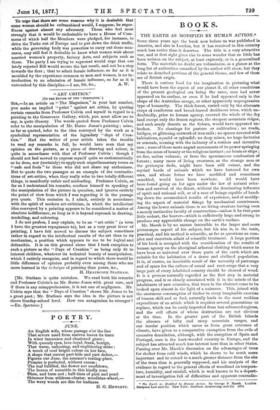"ART CRITICS."
rro THE EDITOR OF THE ssaarsroa."3
Sra,—In an article on "The Magazines," in your last number, you make an implied " point " against art critics, by quoting -certain remarks from Professor Colvin and myself in regard to a painting in the Grosvenor Gallery, which, you must allow me to say, is quite illusory. The words quoted from Professor Colvin refer to the manipulation of Mr. Burne Jones's painting ; mine, as far as quoted, refer to the idea conveyed by the work as a symbolical representation of the legendary "days of Crea- tion." Had the writer of your article taken the trouble to read my remarks in full, he would have seen that my opinion on the picture, as a piece of drawing and colour, is quite in accordance with that of Professor Colvin ; though I should not feel moved to express myself quite so enthusiastically as he does, nor (certainly) to apply such unparliamentary terms as "oafs and fools" to those who did not share my enthusiasm. But to quote the two passages as an example of the contradic- tions of art-critics, when they really refer to two totally different things, is manifestly unfair and misleading. Professor Colvin, as far as I understand his remarks, confines himself to speaking of the manipulation of the picture in question, and ignores entirely the point of view from which I was regarding it in the passage you quote. This omission is, I admit, entirely in accordance with the spirit of modern art-criticism, in which the intellectual idea conveyed by a painting appears to be considered a matter of absolute indifference, so long as it is beyond reproach in drawing, modelling, and colouring.
I do not profess, I may explain, to be an "art critic" (a term I have the greatest repugnance to), but as a very great lover of painting, I have felt moved to discuss the subject sometimes rather in regard to the intellectual results of the art than to its mechanism, a position which appears to me to be logical and defensible. It is on this ground alone that I took exception to such a picture as the "Days of Creation" as being only fit to interest children, whatever its technical beauty of manipulation, which I entirely recognise, and in regard to which there would be little difference of opinion probably even among those who are more learned in the technique of painting than yours, &c., H. IlEATHCOTE STATHAM.
[Mr. Statham is quite mistaken. We read both his remarks and Professor Colvin's on Mr. Burne Jones with great care, and if there is any misapprehension, it is not one of negligence. Mr.
Colvin says that the "Days of Creation" shows Mr. Jones to be a great poet ; Mr. Statham says the idea in the picture is not -above Sunday-school level. How can antagonism be stronger? —En. Spectator.]


































 Previous page
Previous page